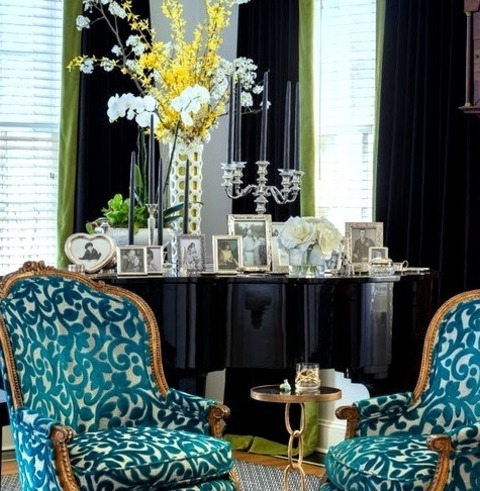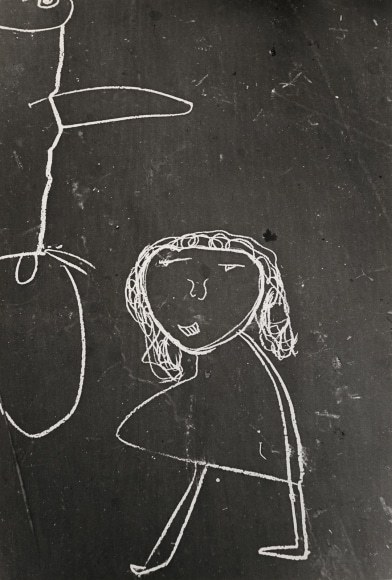Modern Art - Blog Posts

Eclectic Bedroom - Guest
Philadelphia Modern Living Room

Large modern enclosed living room idea with a dark wood floor, gray walls, and no fireplace or television.

Dining Room Enclosed An illustration of a mid-sized eclectic enclosed dining room with a medium tone wood floor and a brown floor.

“Bad Venus”

Freestanding Home Office in San Francisco Inspiration for a small modern freestanding desk with a white wall and carpeted floor home office renovation

Bedroom Guest Inspiration for a large modern guest carpeted and gray floor bedroom remodel with white walls

Living Room - Contemporary Living Room Living room - large contemporary formal and enclosed concrete floor and gray floor living room idea with gray walls and no tv
Music Room Dallas

Image of a medium-sized, elegant living room in a loft-style building with a music area, beige walls, a traditional fireplace, and a tile fireplace.
Living Room Enclosed

Idea for a large transitional enclosed living room with gray walls, a standard fireplace, a stone fireplace, and no television.

Richmond Eclectic Living Room An illustration of a mid-sized eclectic formal living room with gray walls, a standard fireplace, a stone fireplace, and no television. The room is enclosed, carpeted, and has a black floor.

Modern Family Room - Enclosed Mid-sized minimalist enclosed family room image with a dark wood floor and white walls

Dining Room - Contemporary Dining Room Inspiration for a large contemporary medium tone wood floor and gray floor enclosed dining room remodel with white walls
the david zwirner gallery and the felix gonzalez torres foundation in the smithsonian removed the descriptive plaque for portrait of ross in la by felix gonzalez-torres. the old plaque explained portrait for ross' origins as the artist's partner's aids related death, and replaced it with a plaque with absolutely no information about the piece itself, who ross was, or who gonzalez-torres was either. portrait of ross was also reeranged to lay on the floor long ways instead of in a pile as it typically is situated, and the plaque outside the exhibition FOR GONZALEZ-TORRES omits his sexuality, as well as his aids related death. i'm in utter disbelief



I'm going to wear this in public one day and give someone a heart attack

But for now it's just a sticker










Some of My Art

Austin Living Room Enclosed Living room - mid-sized transitional enclosed dark wood floor living room idea with beige walls, a standard fireplace and a wall-mounted tv
You know that play is an essential and profound part of humanity when it's inspired countless works of art.

Girl on the swings, 1953.
Photo: Ernst Haas via Design You Trust
Playground sculptures. A fun, whimsical and culturally universal way to inspire learning!

Fiastyúk (then Thälmann) street housing estate, Budapest, 1960. From the Budapest Municipal Photography Company archive.
I couldn't include everyone in my piece my piece "Form, Function and Fun: Playgrounds as Art Education," so I'll have to do a follow up blog post discussing Aldo van Eyck's work and philosophy around play and playground design.

When Aldo van Eyck assumed work at the Amsterdam Public Works (Amsterdam Publieke Werken) one task soon became his focal point: the design of playgrounds accessible for every child in every neighborhood of the city. Until then there existed only secluded playgrounds initiated by playground associations of which children had to be member to gain access. On Jacoba Mulder’s initiative Van Eyck made a first design for the Bertelmanplein consisting of a sandbox in which four large rocks and an arch-shaped climbing frame were placed. This design was his point of departure for many more playgrounds to come (Van Eyck eventually realized some 700 of them) but also a testing ground for his ideas about architecture, relativity and imagination. Especially with regards to relativity. i.e. the non-hierarchical arrangement of the different components based on their mutual relationships, the playgrounds proved to be of great importance for Van Eyck’s theoretical reflections.
In 2002 the Stedelijk Museum in Amsterdam devoted an entire exhibition to Aldo van Eyck’s playground that was accompanied by the present catalogue: „Aldo van Eyck: De Speelplaatsen en de Stad“, edited by Liane Lefaivre & Ingeborg de Roode and published by NAi uitgevers. The catalogue collects a wealth of photos and drawings that in turn provide insights into a body work that in many ways appealed to the architect. For Aldo van Eyck the children’s perspective on city and architecture as well as the lighthearted creativity that went along with it were of integral importance. As the authors show, he had his play equipment designs tested by his own children and at the same time let himself inspire by artists and artworks he admired. The result were playgrounds that on the one hand appealed to children and on the other hand tell a lot about Van Eyck’s intellectual and creative reference system. Unfortunately only a fraction of them still exist today….


First image: Irving Kriesberg, (no title) drawing from the Chicago Field Museum of Natural History, c. 1929, graphite on paper. Collection of the Irving Kriesberg Estate Foundation. Second image: Irving Kriesberg, The Victim, 1994, oil on canvas. Collection of the Irving Kriesberg Estate Foundation.
Irving Kriesberg developed an aptitude for art at an early age by filling notebooks with drawings of museum taxidermy he encountered at Chicago’s Field Museum of Natural History. This early experience of biological rendering made a lasting impression on Kriesberg, who manifested his own animal imagery and phenomenal aesthetic environments throughout his career.
The untitled graphite drawing of a leopard seizing a bird in its claws is from around 1929, which would mean that Irving was about 10 years old when he drew it; the painting, titled The Victim, is from 1994, when Irving was 75. Both compositions feature a large cat pouncing on a bird.
It is amazing to see how interests, explorations and influences from childhood manifest creatively throughout the course of one's life. This is an apt insight into artistic development of a professional artist. Read more about this phenomenon in my latest blog post "The Childhood Origins of Working Artists."

Graphite drawing of a lady with a parasol, made by Paul Klee between ages 4 and 6. Image via Wikimedia Commons.
Read more about the childhood artwork of well known artists in my latest Artfully Learning post here.
Read my latest blog post on Helen Levitt called "Photographing Children’s Play and Art" on Artfully Learning: https://theartsandeducation.wordpress.com/2023/01/05/photographing-childrens-play-and-art/

Helen Levitt New York, c. 1942 Signed, titled N.Y. and dated CIRCA 1942 on verso
I wrote about Asawa's journey to become a renowned artist and art educator in a post titled "Weaving Art with Life." Read it now on Artfully Learning: https://theartsandeducation.wordpress.com/2022/11/15/weaving-art-with-life/
![Ruth Asawa Teaching Paper Folding, Ca. 1980s [© Estate Of Ruth Asawa]](https://64.media.tumblr.com/c6697e63db07e75713b9443a406a9541/2bbbef9b26c5b1e4-6d/s500x750/168a1e1b79e95e732420c4cb6bd78cd67fab00ba.png)
Ruth Asawa teaching paper folding, ca. 1980s [© Estate of Ruth Asawa]

Helen Levitt, Graffiti: Chalk Drawing of Figure with Double Pupils, New York City, c.1940, gelatin silver print. Source: The Metropolitan Museum of Art
American photographer Helen Levitt is known for her documentary and candid style street photography of everyday life. One of her recurring subjects is children at play. She also captured their whimsical works of art, such as this 1940s photograph of a children's chalk drawing in New York City.

Louise Berliawsky, (no title), c. 1905. Courtesy of the American Art Collaborative.
This is an early twentieth century interior scene by a young girl named Louise Berliawsky, who grew up to become renowned for her modernist monochromatic, wooden sculptures under the name Louise Nevelson. Read more about the importance and influence of children's art in modern and contemporary culture via my Artfully Learning post "Conference of the Animals & 120 Years of Children Drawing New York City."

Color plate from the 1922 publication, "Christmas Pictures by Children." This illustration was made by students of Austrian artist and educator, Franz Čižek. Čižek established his Juvenile Art Class in Vienna, Austria in 1897. His student-centered approach to teaching, and his philosophy that children's art should be a unique genre (and not compared to adult art), led to the foundation of the Child Art Movement.

Jiro Yoshihara, Please Draw Freely, 1956. Paint and marker on wood. Installation view during the Outdoor Gutai Art Exhibition in Ashiya Park, Ashiya, 27 July – 4 August, 1956.
Yoshihara was a leading member of the Japanese avant-garde Gutai Group of visual artists, known for their physical and oft-confrontational artworks. A lesser discussed aspect of their legacy is their contributions to art education, which truly highlight the potency and potential of communal creativity. I wrote about the latter aspect on Artfully Learning in a post called "The Gutai Group: Play, Pedagogy and Possibility." Read it here: https://theartsandeducation.wordpress.com/2022/08/03/the-gutai-group-play-pedagogy-and-possibility/
The lineage of many popular educational materials used in schools today can be traced through art history. In a post called "The Art of Child's Play," I wrote about several examples of modern and contemporary artists creating educational toys and learning materials. Read it on Artfully Learning: https://theartsandeducation.wordpress.com/2022/03/24/the-art-of-childs-play/


Puppets by Paul Klee named the Philistine, Matchbox Spirit, and the Crowned Poet — Source: Zentrum Paul Klee, Bern (CC BY-SA 4.0).Puppets by Paul Klee named the Old Man, the Devil with Ringed Glove, and the Monk — Source: Zentrum Paul Klee, Bern (CC BY-SA 4.0).1)
2) Puppets by Paul Klee named the Ghost of a Scarecrow, Electrical Spook, and Mr Death — Source: Zentrum Paul Klee, Bern (CC BY-SA 4.0).

3) Puppets by Paul Klee named the Philistine, Matchbox Spirit, and the Crowned Poet — Source: Zentrum Paul Klee, Bern (CC BY-SA 4.0).
“And yet for all their fixedness, the figures’ power lies in their yet being infinitely accessible, innocent, and welcoming things; they are children who have survived their childhood, grown old, but retained something of that early state. They are representatives of some world that belongs at once to children and adults, and to some more mysterious world they share within creation. Klee wrote in his diary of 1901: “The future slumbers in human beings and needs only to be awakened. It cannot be created. That is why even a child knows about the erotic.”2″

Puppets by Paul Klee named the Big-Eared Clown, Self-Portrait (of Klee), and the White-Haired Eskimo — Source: Zentrum Paul Klee, Bern (CC BY-SA 4.0).
via

One of Paul Klee’s teaching notes on pictorial creation, reproduced from ‘Paul Klee: Life and Work,’ the authoritative Klee overview, back in print from @hatjecantzverlag The many books on Paul Klee (1879-1940) published over the years should not obscure the fact that there has been no new, comprehensive Klee overview since Will Grohmann’s oft-reprinted 1954 monograph. With 'Paul Klee: Life and Work,’ the @zentrumpaulklee has set out to fill this gap, drawing on a wealth of new resources including the Klee family’s archives, much of which is published here for the first time. Life and work are truly integrated in this massive, 344-page volume: Klee’s vast body of work is surveyed chronologically, as the book narrates his life alongside the abundant reproductions of drawings, paintings, watercolors, sculptures, puppets and numerous archival documents and photographs (nearly 500 reproductions in total). The book divides Klee’s career into eight periods: “Childhood and Youth”; “Munich and the Encounter with the Avant Garde”; “World War I and the Breakthrough to Success”; “At the Bauhaus in Weimar”; “Master of Modern Art”; “The Move to Dusseldorf and the Nazi Rise to Power”; “First Years of Emigration in Bern”; and “Final Years.” The result of many years of research and labor, this magisterial publication demonstrates conclusively why Klee numbers among the most influential and best-loved artists of the past 100 years. Read more via linkinbio. #paulklee #klee #bauhhaus #pictorialcreation #pedagogy #teachingnotes #abstraction https://www.instagram.com/p/CNVmXWQppb_/?igshid=1a3e8wtaf3oag
